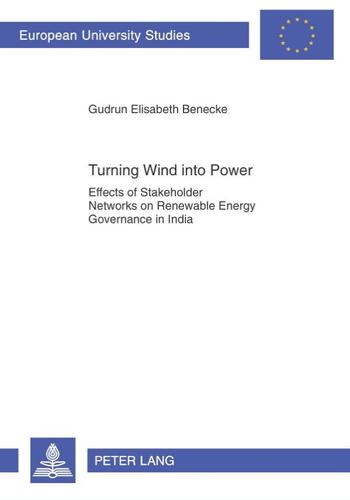Turning Wind into Power: Effects of Stakeholder Networks on Renewable Energy Governance in India
Content
FIGURES & TABLES 11
ACRONYMS 13
CHAPTER I
GOVERNANCE FAILURE - MARKET FAILURE? SPATIAL VARIATIONS IN RENEWABLE ENERGY DEPLOYMENT 15
I.1 Setting the Context for Renewable Energy Governance 16
I.1.1 Climate Change and Development Dilemmas 16
I.1.2 Renewable Energies for Sustainable Development 18
I.2 Realities of Renewable Energy and Governance 20
I.2.1 Spatial Variations - The Research Puzzle 20
I.2.2 Governance of Renewable Energy 23
I.3 Researching Renewable Energy Governance in Developing Countries 25
I.3.1 Methods and Methodology 25
I.3.2 Looking Behind the Veil - Roadmap to the Thesis 31
CHAPTER II
INTERDISCIPLINARY PERSPECTIVES ON RENEWABLE ENERGY DEPLOYMENT IN DEVELOPING COUNTRIES 35
II.1 Renewable Energy Deployment - The Developmental Dimension 36
II.1.1 Developmental Conditions - Generic Barriers to Renewable EnergyDeployment 36
II.1.2 Developmental Conditions Matter? - Development Economics 37
II.2 Renewable Energy Deployment - The Policy Dimension 39
II.2.1 Policy Conditions - Policy and Regulatory Barriers to RenewableEnergy Deployment 40
II.2.2 Politics Matters? - New Institutional Approaches 42
II.3 Renewable Energy Deployment - The Economic Dimension 49
II.3.1 Economic Conditions - Techno-Economic Obstacles to RenewableEnergy Deployment 49
II.3.2 Economics Matter? - Economic Geography and Spatial Economics 52
II.4 Renewable Energy Deployment - The External Dimension 54
II.4.1 External Conditions - Stimuli to Overcome Internal Barriers 55
II.4.2 External Stimuli Matter? - International Policy Diffusion and New Modesof Governance 57
II.5 Analytical Framework for Renewable Energy Deployment 61
CHAPTER III
DRIVERS OF RENEWABLE ENERGY DEPLOYMENT IN INDIAAPPROACHING THE EMPIRICS STAGE I 65
III.1 Multilevel Perspectives on Wind Energy 65
III.2 Analysing Wind Energy Determinants in India 76
III.2.1 Socio-Economic Requirements for Wind Energy Deployment 77
III.2.2 Policy Determinants for Wind Energy Deployment 82
III.2.3 Economic Conditions for Wind Energy Deployment 89
III.2.4 External Stimuli for Wind Energy Deployment 98
III.3 Synopsis of Main Findings and Implications 103
CHAPTER IV
EXPLAINING RENEWABLE ENERGY GOVERNANCE IN THE FRAMEWORK
OF SOCIOLOGICAL PERSPECTIVES 107
IV.1 Who Governs? - Stakeholder Characteristics in the Light of Organisational Studies 109
IV.2 How is Governed? - Stakeholder Relations and New Economic Sociology 117
IV.3 Stakeholder Networks in the Governance Framework - Tackling the Puzzle 129
IV.4 Explanatory Model for Wind Energy Deployment in India 134
CHAPTER V
CONDITIONS FOR WIND ENERGY DEVELOPMENT IN TAMIL NADU AND KERALA: DEEP DIVE INTO THE EMPIRICS STAGE II 143
V.I Wind Energy Deployment in Tamil Nadu - The Indian Success Story 144
V.1.1 Who Governs?: Actors' Attributes in Stakeholder Networks 145
V.1.2 How is Renewable Energy Governed?: Actors' Relations in Stakeholder Networks 160
V.1.3 Governing Renewable Energy: Stakeholder Networks in Tamil Nadu 168
V.2 Wind Energy Deployment in Kerala - India's Lost Case? 170
V.2.1 Who Governs?: Actors' Attributes in Stakeholder Networks 171
V.2.2 How is Renewable Energy Governed?: Actors' Relations in Stakeholder Networks 184
V.2.3 Renewable Energy Governance: Stakeholder Networks in Kerala 191
V.3 Wind Energy Deployment in India - Results and Implications 194
V.3.1 Contrasting Determinants of Wind Energy Deployment in Tamil Nadu and Kerala 194
V.3.2 Tracing the Process of Wind Energy Deployment in Tamil Nadu and Kerala 197
CHAPTER VI
TURNING WIND INTO POWER - EFFECTIVE RENEWABLE ENERGY
GOVERNANCE IN DEVELOPING COUNTRIES 205
VI.1 Stakeholder Network Effects - Theory Implications 206
VI.1.1 Who Governs? Governance Actors in Stakeholder Networks 207
VI.1.2 How is Governed? Governance Agency in Stakeholder Networks 213
VI.1.3 Why Governance? Power of Renewable Energy Stakeholder Networks 220
VI.2 Empirical Implications of Stakeholder Networks 231
Vl.2.1 External Stimuli for Renewable Energy Governance 231
Vl.2.2 New Modes of Governance and Stakeholder Networks 236
CHAPTER VII
CONCLUSIONS - BEYOND STAKEHOLDER NETWORKS FOR RENEWABLE ENERGY GOVERNANCE 245
APPENDIX 255
ANNEX I: List of Interview Partners 255
ANNEX II: Sample Interview Guideline 257
ANNEX III: Sample Stakeholder Network Map 260
BIBLIOGRAPHY & SECONDARY SOURCES 261

